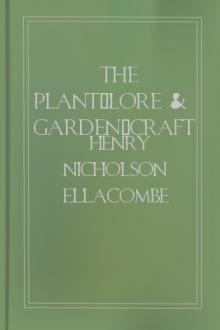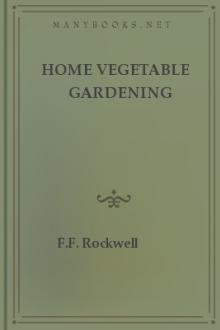The plant-lore & garden-craft of Shakespear by Henry Nicholson Ellacombe (top romance novels .TXT) 📕

- Author: Henry Nicholson Ellacombe
- Performer: -
Book online «The plant-lore & garden-craft of Shakespear by Henry Nicholson Ellacombe (top romance novels .TXT) 📕». Author Henry Nicholson Ellacombe
The Project Gutenberg EBook of The plant-lore and garden-craft of Shakespeare, by
Henry Nicholson Ellacombe
This eBook is for the use of anyone anywhere at no cost and with
almost no restrictions whatsoever. You may copy it, give it away or
re-use it under the terms of the Project Gutenberg License included
with this eBook or online at www.gutenberg.net
Title: The plant-lore and garden-craft of Shakespeare
Author: Henry Nicholson Ellacombe
Release Date: March 25, 2009 [EBook #28407]
Language: English
*** START OF THIS PROJECT GUTENBERG EBOOK PLANT-LORE OF SHAKESPEARE ***
Produced by Irma Spehar, Michael Zeug, Lisa Reigel, and
the Online Distributed Proofreading Team at
http://www.pgdp.net (This file was produced from images
generously made available by The Internet Archive/Canadian
Libraries)
Transcriber's Notes:
Variations in spelling and hyphenation have been left as in the original. Some typographical and punctuation errors have been corrected. A complete list follows the text. Greek words that may not display correctly in all browsers are transliterated in the text using hovers like this: βιβλος. Position your mouse over the line to see the transliteration. Underlined letters indicate diacritical marks and special characters that may not be visible in all browsers. Position your mouse over the line to see an explanation.
THE PLANT-LORE AND GARDEN-CRAFT OFSHAKESPEARE.
PRESS NOTICES OF FIRST EDITION.
"It would be hard to name a better commonplace book for summer lawns. . . . The lover of poetry, the lover of gardening, and the lover of quaint, out-of-the-way knowledge will each find something to please him. . . . It is a delightful example of gardening literature."—Pall Mall Gazette.
"Mr. Ellacombe, with a double enthusiasm for Shakespeare and for his garden, has produced a very readable and graceful volume on the Plant-Lore of Shakespeare."—Saturday Review.
"Mr. Ellacombe brings to his task an enthusiastic love of horticulture, wedded to no inconsiderable practical and theoretical knowledge of it; a mind cultivated by considerable acquaintance with the Greek and Latin classics, and trained for this special subject by a course of extensive reading among the contemporaries of his author: and a capacity for patient and unwearied research, which he has shown by the stores of learning he has drawn from a class of books rarely dipped into by the student—Saxon and Early English herbals and books of leechcraft; the result is a work which is entitled from its worth to a place in every Shakesperian library."—Spectator.
"The work has fallen into the hands of one who knows not only the plants themselves, but also their literary history; and it may be said that Shakespeare's flowers now for the first time find an historian."—Field.
"A delightful book has been compiled, and it is as accurate as it is delightful."—Gardener's Chronicle.
"Mr. Ellacombe's book well deserves a place on the shelves of both the student of Shakespeare and the lover of plant lore."—Journal of Botany.
"By patient industry, systematically bestowed, Mr. Ellacombe has produced a book of considerable interest; . . . full of facts, grouped on principles of common sense about quotations from our great poet."—Guardian.
"Mr. Ellacombe is an old and faithful labourer in this field of criticism. His 'Plant-lore and Garden-craft of Shakespeare' . . . is the fullest and best book on the subject."—The Literary World (American).
THE PLANT-LORE & GARDEN-CRAFT OF SHAKESPEARE.
BY
REV. HENRY N. ELLACOMBE, M.A.,OF ORIEL COLLEGE, OXFORD,
VICAR OF BITTON, GLOUCESTERSHIRE, AND HON. CANON OF BRISTOL.
SECOND EDITION.
PRINTED FOR
W. SATCHELL AND CO.,
AND SOLD BY,
SIMPKIN, MARSHALL, AND CO.,
LONDON.
1884.
I pipe of plants, I sing of somer flowers."
TO THE READER.
"Faultes escaped in the Printing, correcte with your pennes; omitted by my neglygence, overslippe with patience; committed by ignorance, remit with favour."
CONTENTS.Since the publication of the First Edition I have received many kind criticisms both from the public critics and from private friends. For these criticisms I am very thankful, and they have enabled me to correct some errors and to make some additions, which I hope will make the book more acceptable and useful.
For convenience of reference I have added the line numbers to the passages quoted, taking both the quotations and the line numbers from the Globe Shakespeare. In a few instances I have not kept exactly to the text of the Globe Edition, but these are noted; and I have added the "Two Noble Kinsmen," which is not in that Edition.
In other respects this Second Edition is substantially the same as the First.
Bitton Vicarage, Gloucestershire,
February, 1884.
The following Notes on the "Plant-lore and Garden-craft of Shakespeare" were published in "The Garden" from March to September, 1877.
They are now republished with additions and with such corrections as the altered form of publication required or allowed.
As the Papers appeared from week to week, I had to thank many correspondents (mostly complete strangers to myself) for useful suggestions and inquiries; and I would again invite any further suggestions or remarks, especially in the way of correction of any mistakes or omissions that I may have made, and I should feel thankful to any one that would kindly do me this favour.
In republishing the Papers, I have been very doubtful whether I ought not to have rejected the cultural remarks on several of the plants, which I had added with a special reference to the horticultural character of "The Garden" newspaper. But I decided to retain them, on finding that they interested some readers, by whom the literary and Shakespearean notices were less valued.
The weekly preparation of the Papers was a very pleasant study to myself, and introduced me to much literary and horticultural information of which I was previously ignorant. In republishing them I hope that some of my readers may meet with equal pleasure, and with some little information that may be new to them.
Bitton Vicarage, Gloucestershire,
May, 1878.
ALL the commentators on Shakespeare are agreed upon one point, that he was the most wonderfully many-sided writer that the world has yet seen. Every art and science are more or less noticed by him, so far as they were known in his day; every business and profession are more or less accurately described; and so it has come to pass that, though the main circumstances of his life are pretty well known, yet the students of every art and science, and the members of every business and profession, have delighted to claim him as their fellow-labourer. Books have been written at various times by various writers, which have proved (to the complete satisfaction of the writers) that he was a soldier,[1:1] a sailor, a lawyer,[1:2] an astronomer, a physician,[1:3] a divine,[1:4] a printer,[1:5] an actor, a courtier, a sportsman, an angler,[2:1] and I know not what else besides.
I also propose to claim him as a fellow-labourer. A lover of flowers and gardening myself, I claim Shakespeare as equally a lover of flowers and gardening; and this I propose to prove by showing how, in all his writings, he exhibits his strong love for flowers, and a very fair, though not perhaps a very deep, knowledge of plants; but I do not intend to go further. That he was a lover of plants I shall have no difficulty in showing; but I do not, therefore, believe that he was a professed gardener, and I am quite sure he can in no sense be claimed as a botanist, in the scientific sense of the term. His knowledge of plants was simply the knowledge that every man may have who goes through the world with his eyes open to the many beauties of Nature that surround him, and who does not content himself with simply looking, and then passing on, but tries to find out something of the inner meaning of the beauties he sees, and to carry away with him some of the lessons which they were doubtless meant to teach. But Shakespeare was able to go further than this. He had the great gift of being able to describe what he saw in a way that few others have arrived at; he could communicate to others the pleasure that he felt himself, not by long descriptions, but by a few simple words, a few natural touches, and a few well-chosen epithets, which bring the plants and flowers before us in the freshest, and often in a most touching way.
For this reason the study of the Plant-lore of Shakespeare is a very pleasant study, and there are other things which add to this pleasure. One especial pleasure arises from the thoroughly English character of his descriptions. It has often been observed that wherever the scenes of his plays are laid, and whatever foreign characters he introduces, yet they really are all Englishmen of the time of Elizabeth, and the scenes are all drawn from the England of his day. This is certainly true of the plants and flowers we meet with in the plays; they are thoroughly English plants that (with very few exceptions) he saw in the hedgerows and woods of Warwickshire,[2:2] or in his own or his friends' gardens. The descriptions are thus thoroughly fresh and real; they tell of the country and of the outdoor life he loved, and they never smell of the study lamp. In this respect he differs largely from Milton, whose descriptions (with very few exceptions) recall the classic and Italian writers. He differs, too, from his contemporary Spenser, who has certainly some very sweet descriptions of flowers, which show that he knew and loved them, but are chiefly allusions to classical flowers, which he names in such a way as to show that he often did not fully know what they were, but named them because it was the right thing for a classical poet so to do. Shakespeare never names a flower or plant unnecessarily; they all come before us, when they do come, in the most natural way, as if the particular flower named was the only one that could be named on that occasion. We have nothing in his writings, for instance, like the long list of trees described (and in the most interesting way) in the first canto of the First Book of the "Faerie Queene," and indeed he is curiously distinct from all his contemporaries. Chaucer, before him, spoke much of flowers and plants, and drew them as from the life. In the century after him Herrick may be named as another who sung of flowers as he saw them; but the real contemporaries of Shakespeare are, with few exceptions,[3:1] very silent on the subject. One instance will suffice. Sir Thomas Wyatt's poems are all professedly about the country—they abound in woods and vales, shepherds and swains—yet in all his poems there is scarcely a single allusion to a flower in a





Comments (0)